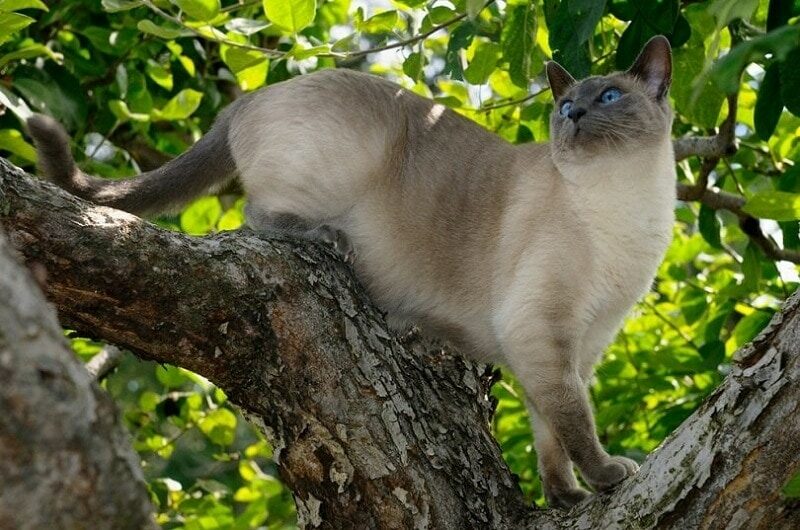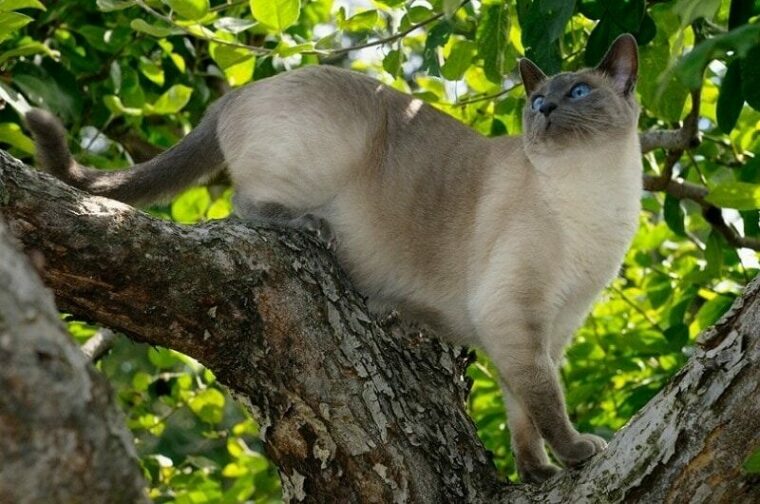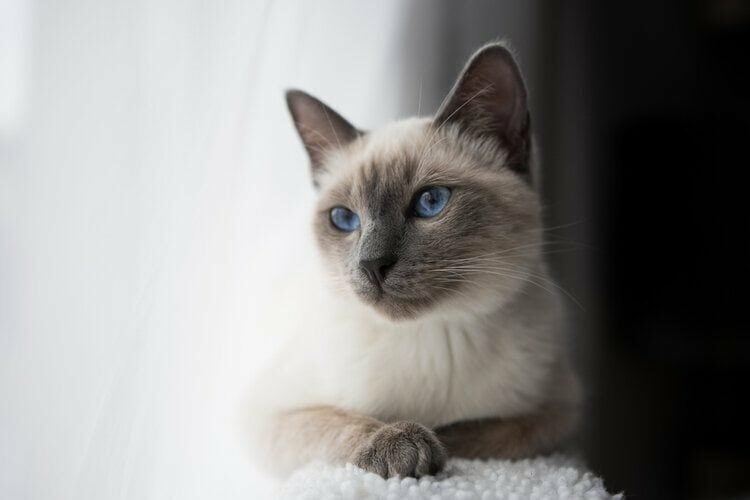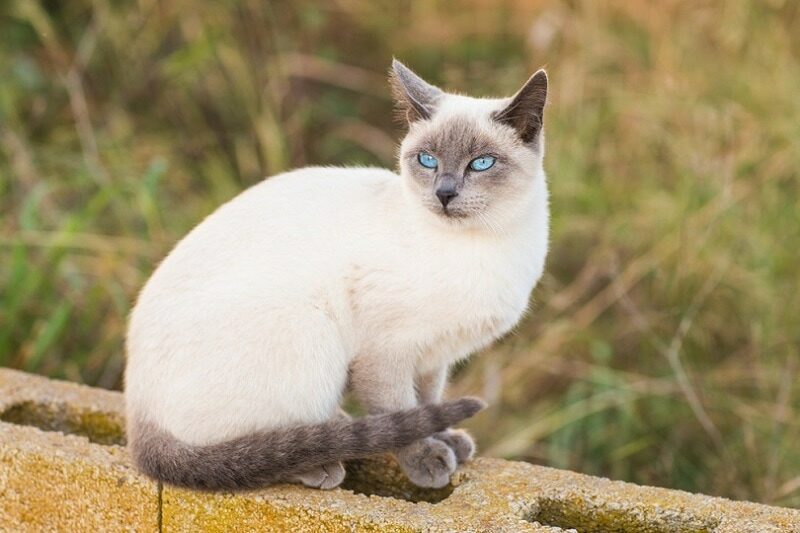
[ad_1]

The Blue Point Siamese cat is instantly recognizable due to their pointed coat. Though they were originally native to Thailand, this breed was developed mainly in Europe and North America. Today, these cats have been refined to have bright blue eyes, large ears, and a very slender body. Still, their most recognizable feature is their unique pointed coat due to a unique gene that this breed carries.
These cats are well-known for being affectionate and social. Many people describe them as behaving more similarly to dogs than cats. They can even be trained to play fetch and other dog activities. Many will seek companionship and get along well with other felines and dogs, making them popular among families.
The Earliest Records of Blue Point Siamese Cat in History
The earliest depictions of a Siamese-type cat appear in an ancient manuscript known as the Tamra Maew, a book of cat poems. This manuscript was thought to be written sometime between 1351 and 1767 in what is modern-day Thailand.
Several breeds were mentioned in this book of poems, but only one is the ancestor of the Siamese. The other breeds in the book include the Korat cat, Konja cat, and Suphalak. These other cats are pretty rare today when compared to the Siamese.

How the Blue Point Siamese Gained Popularity
The first record of a Siamese cat being imported to the United States was in 1878, when U.S. President Rutherford B. Hayes received this cat as a gift from the American Consul in Bangkok. The cats appeared in the U.K. in 1884. This time two breeding cats were brought back to the U.K. They later produced three kittens, though these did not live to produce their own kittens. The line stopped there.
More cats were imported into both countries. Initially, the cat breed was not widely accepted, primarily due to their triangular head and more oversized ears. However, slowly, the cat gained some acceptance. The cat finally began increasing in popularity in the 1950s. The cat was developed into a slenderer breed through selective breeding. This created a long, fine-boned cat that is similar to the one we know today.

Formal Recognition of the Blue Point Siamese
Most major cat associations readily recognized the Siamese cat. However, there is some controversy regarding precisely what the Siamese looks like. After the slenderer version of the Siamese started being produced in the 1950s, the traditional, bulkier version was quickly pushed out of the limelight.
By the 1980s, much of the original cat had disappeared. However, a few breeders continued to breed and register them. The U.K. continued to recognize them as the same breed as the newer, slender version. This led to two different types of Siamese cats, though they are technically the same breed.
These two types have the same ancient ancestor. However, they do not share any modern ancestors. For this reason, there is a lot of controversy over making these cats different breeds completely.
The International Cat Association does not recognize Siamese cats that are not of the new slender type and cats imported directly from Thailand as Thai cats. Other cat associations have not separated the breeds just yet, so they are still counted as the same.
Top 4 Unique Facts About the Blue Point Siamese
1. A particular gene causes their unique color
The Siamese’s pointed coat is caused by one particular gene called the Himalayan gene. This gene causes the pigment in their coat to react strangely to temperature changes. When it is too warm, the pigment cannot be expressed, leaving the cat lighter. When it is cold, though, the darker pigment comes through.
For this reason, the cats are typically lighter around their torso since they are warmer in this area. Their extremities tend to be darker, as this is where they are coldest.
2. Many cats change colors
Because their pigment is reactant to heat, these cats can change colors as the temperature changes. Many kittens are born completely white, as the temperature inside their mother is hot. However, as they age, they tend to become darker. The oldest cats are the darkest, as they tend to be colder in general.
Environmental differences can change their color as well. If it is cold, they may become darker.

3. They are often described as dog-like
Often, these cats are described as “dog-like” due to their socialness and affectionate levels. They can often be trained to perform many tricks, and many even enjoy playing fetch. Their ability to get along with most other pets and people makes them popular in families. They make great pets, especially if you have children.
4. They’re rather noisy
The Siamese is known for being rather chatty and noisy. It isn’t odd for a cat to follow their human around the house and meow. They usually have a loud, low-pitch meow that can travel quite far. If they want something, they usually don’t mind letting their people know.

Does the Blue Point Siamese Make a Good Pet?
These cats are well-known for their ability to make great house pets. They are very social and affectionate. Unlike other cats, they typically aren’t scared of strangers or anything of that sort. Instead, they tend to be rather outgoing and enjoy people. Some even describe them as “dog-like” due to these traits.
They are relatively easy to take care of as well. Unlike many long-haired cats, these felines do not require much grooming. They also aren’t highly active, so their exercise needs aren’t wildly out-of-control either.
Many people are surprised by how intelligent the Siamese is. These cats can be trained with some ease and are well-known for walking on leashes without much fuss. They can be trained to do nearly anything that a dog can, including play fetch.
The only major downside of this breed is that they need regular attention. Without it, they can be pretty demanding and may exhibit some destructive behaviors. They are very people-oriented, so they do need interaction with other people. They aren’t best for families that will be gone for much of the day. Instead, they’re perfect for those who will spend much of their time at home or for larger families that can provide them with plenty of attention.
Conclusion
The Blue Point Siamese is one of four different coat colors that the Siamese comes in. Like all other colors, it is pointed, which means that the cat’s extremities will be darker than the rest of its body. This is due to a specific gene that makes their pigment heat-sensitive. Their coloration can even change based on the temperature outside.
These cats make great family pets, no matter what color you choose. They are known for being quite affectionate and dog-like. Many will learn to play fetch and can even walk on a leash. However, they do require quite a bit of attention to be happy. Their people-oriented nature can be both a blessing and a curse, depending on how you look at it.
Featured Image Credit: Reimar, Shutterstock
[ad_2]
Source link


